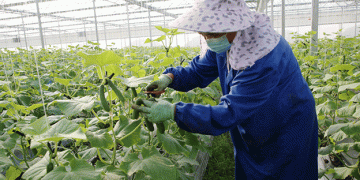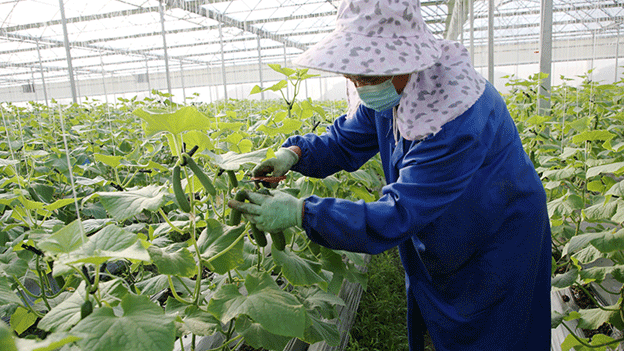Midu County, nestled in the fertile valleys of Yunnan Province, is fast becoming a leading model of China’s next-generation agriculture. Once a region defined by small-scale traditional farming, Midu is undergoing a transformation—driven by investments from agricultural technology companies and supported by local government initiatives focused on modernization.
A flagship example of this change is the organic vegetable base in Xiongjia Ying Village, Xinjie Town. Spanning 270 mu (roughly 18 hectares), the site boasts 18 low-carbon, intelligent greenhouses producing crops like pink tomatoes and fruit cucumbers. These greenhouses are fully operational and equipped with climate control, data-driven irrigation, and smart harvesting systems.
According to base director Huang Meng, the produce has already received national organic certification and has been approved for export to Hong Kong. The main markets are high-end consumers in Shanghai, Beijing, and Guangzhou—cities where demand for safe, traceable, and environmentally friendly produce is growing rapidly.
Production Data and Economic Potential
Early results from trial operations are promising. Pink tomatoes are yielding up to 16 tons per mu, while fruit cucumbers and highland sticky eggplants are exceeding 20 tons per mu. At full capacity by 2025, the base is expected to produce over 4,500 tons of vegetables annually, with an estimated output value surpassing 50 million yuan (~7 million USD). Even more ambitiously, the company plans to expand its operations to 3,000 mu over the next three years, potentially generating 350 million yuan (~49 million USD) annually.
This growth aligns with broader national trends. According to the 2023 China Organic Agriculture Development Report, China’s organic agricultural land reached 3.6 million hectares, ranking third globally. Demand is also climbing: a 2023 Statista report shows the Chinese organic food market exceeded 80 billion yuan and is projected to grow at over 10% annually through 2030.
Infrastructure and Digital Transformation
Midu’s local government is playing an active role. In 2024, the county completed 70,000 mu of high-standard farmland development and facilitated the transfer of 3,368 mu of land for modern agricultural use. The county is pushing forward digitization, precision agriculture, and eco-friendly production practices. The integration of big data, automation, and sustainability reflects China’s national vision for rural revitalization and agricultural modernization.
Midu County’s evolution from a traditional farming region to a technologically advanced organic vegetable hub is a powerful example of how rural areas can embrace innovation and sustainability. With strong public-private collaboration, a clear focus on high-end markets, and the integration of smart technologies, Midu is poised to become a leading force in China’s organic agriculture revolution.































